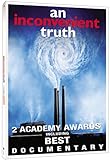However, living here in Silicon Valley, you’d have to be deaf and dumb to ignore not only the social and political momentum building around clean technologies, but also the business opportunities being pursued. I see these as separate (albeit related topics). Some people believe it’s necessary to change how we live — whether in terms of energy consumption, CO2 emissions or solid waste generation. Nothing new there: the first Earth Day was in April 1970, and (particularly here in the Bay Area) there has been a strong environmental movement making strong (some would say shrill) pronouncements about the consequences of misusing (or overusing) the earth’s resources.
 Since that time, we’ve had Kyoto, an Al Gore movie, and the IPCC — and a fear of nuclear winter became a fear of global warming became a fear of climate change — but for many the principle remained unchanged.
Since that time, we’ve had Kyoto, an Al Gore movie, and the IPCC — and a fear of nuclear winter became a fear of global warming became a fear of climate change — but for many the principle remained unchanged.What really is different is the stampede of interest in potential business opportunities, fueled (ahem) both by entrepreneurs and venture capitalists. Al Gore may be just a retired politician and movie producer, but when Klein Perkins made him a VC, the Valley (and the world) took notice.
Because cleantech is a big topic, the focus here is on the entrepreneurial efforts to find electrical engineering energy solutions. Part of this will be on the alternative energy sources, such as wind and solar, as well as related issues such as energy storage (essential to make wind power viable).
But equally important are efforts on energy efficiency, which many argue is a more economically viable and feasible short-term approach to solve energy problems. This is a particularly hot (!) topic here in California, with major research centers at UCSB, UC Davis, UCSB, Lawrence Berkeley Labs, and the University of California, as well as smaller projects at UCSD and UC Merced.
Electricity is a commodity: consumers and businesses normally buy the cheapest possible kilowatt-hours, whatever the source. Thus, my interest is on the economics of alternative energy and energy conservation — when the numbers work, the new technologies will sell themselves and be widely adopted. In other cases, they will depend on government subsidies intended to “prime the pump” — subsidies that ideally (although not always) are pulled as the technologies eventually pay their own way.
This commentary is offered from the standpoint of a strategy professor, business model consultant and firm believer in free market economics. While there are a lot of good blogs on the business of IT, few alternative energy blogs focus on the economics of the industry and the progress it is making (or needs to make) towards becoming economically self-supporting.

![[feed]](http://photos1.blogger.com/x/blogger2/6971/993546936938810/1600/z/962294/gse_multipart3851.gif)
1 comment:
A new blog sir?
So, go to the following website, apply your business acumen and tell me whether or not this car should 'take off'. I for one would be interested in one for my commute!
http://www.aptera.com/
Post a Comment